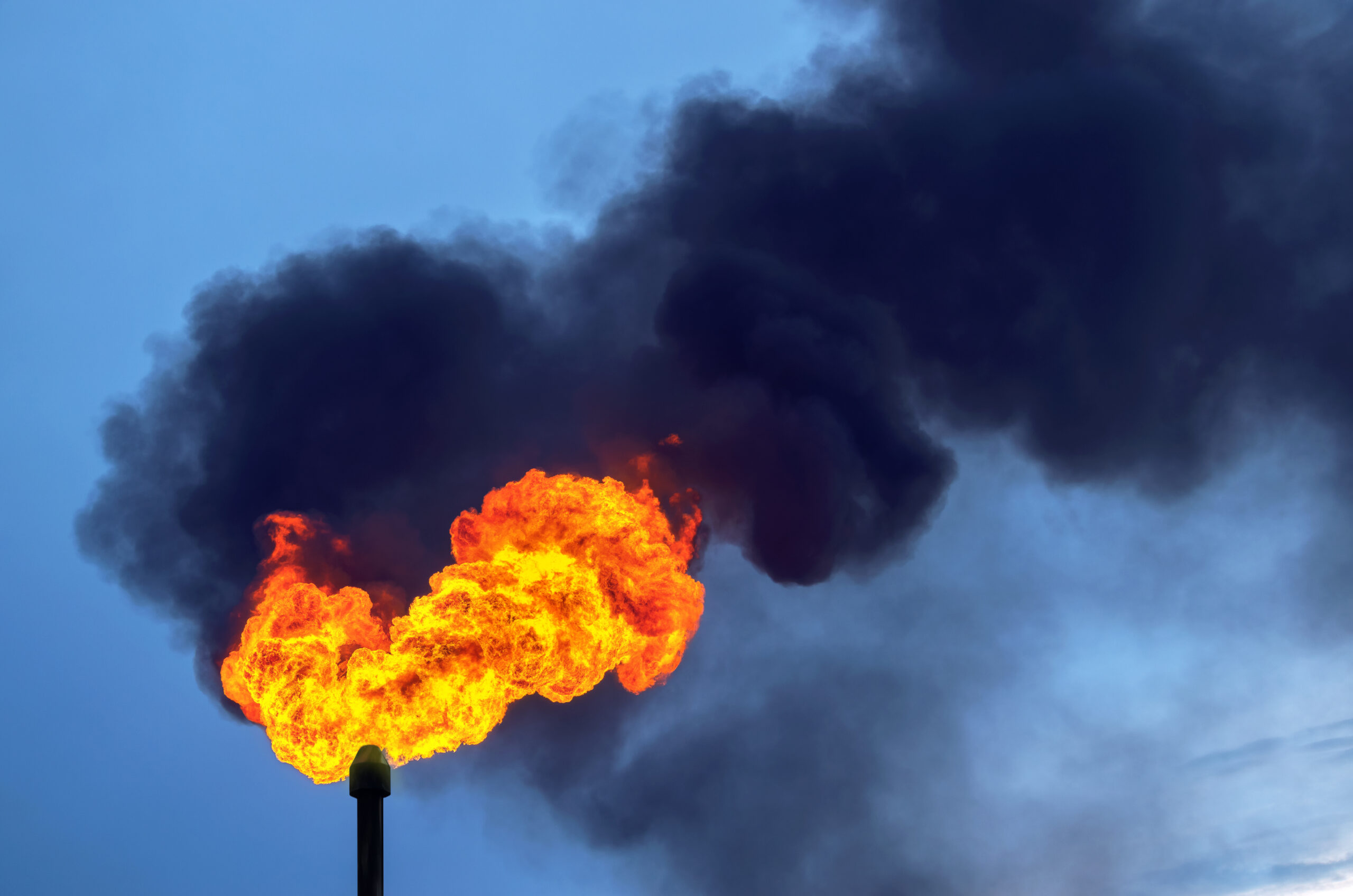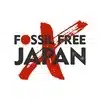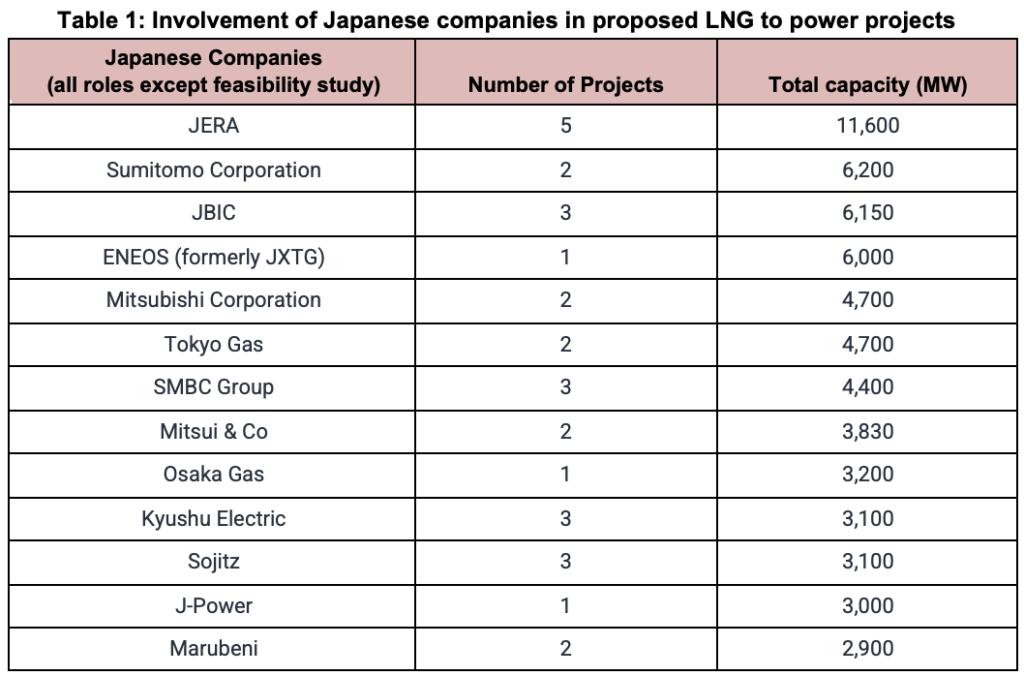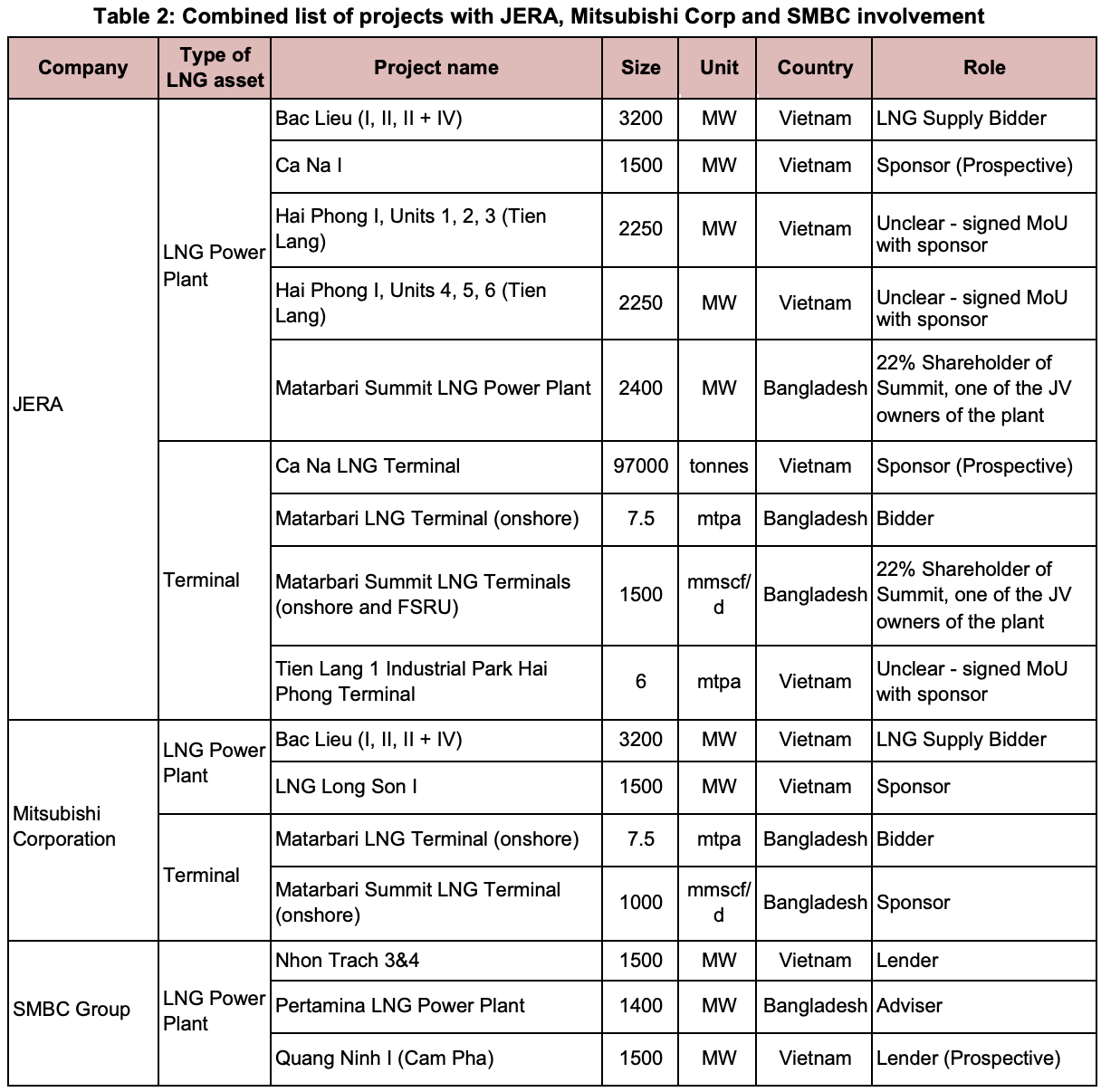
The Japan-backed liquefied natural gas (LNG) buildout in Asia
threatens to derail the global goals of the Paris Agreement.
A new study looking across Bangladesh, Thailand and Vietnam, the sites of the three largest gas power project expansions (outside China), identifies the Japanese companies most actively pursuing a liquefied natural gas (LNG) buildout in Asia, putting the climate goals of the Paris Agreement in peril.
JERA (a joint venture of TEPCO and Chubu Electric), Mitsubishi Corporation and SMBC Group, lead the way among Japanese companies that are collectively attempting to build 16 proposed LNG power projects that would add 33.8 GW of thermal power capacity. Beyond these power projects, 7 LNG import projects are also proposed involving Japanese companies.
This buildout is being proposed despite the International Energy Agency (IEA)’s landmark scenario stating we need to stop adding fossil fuel supply if we are to achieve the goal of net-zero emissions globally by 2050, warning that much of the proposed and even existing LNG infrastructure risks becoming stranded.
The 10 planned LNG projects involving JERA, TEPCO, Chubu Electric, Mitsubishi Corporation and SMBC Group in Bangladesh, Thailand and Vietnam alone would emit close to 1.2 billion tonnes of CO2-e. This is almost double the emission reductions based on Japan’s 2030 Nationally Determined Contributions target.
Japanese companies and the buildout of LNG power in Bangladesh, Thailand and Vietnam
Market Forces reviewed the LNG projects slated for Bangladesh, Thailand, and Vietnam, the countries with the three largest gas power project buildouts in Asia after China (according to the Global Energy Monitor’s (GEM) Global Gas Plant Tracker January 2022, based on capacity under construction and proposed).
Japan and the USA play a key role in the planned buildout of LNG projects. Japanese companies make up a quarter of all proposed LNG to power projects with known foreign sponsors (83 LNG power projects in total). Japanese companies are involved in almost 40% of projects by capacity proposed for Bangladesh, Thailand and Vietnam.
Of the Japanese companies, JERA (joint venture of TEPCO and Chubu Electric), Mitsubishi Corporation and SMBC Group are among the most heavily involved:
- JERA is involved in 5 proposed LNG to power projects totalling 11,600 MW in Bangladesh and Vietnam.
- Mitsubishi Corporation is involved in 2 proposed LNG power projects totalling 4,700 MW in Vietnam. JERA and Mitsubishi Corporation rank among the highest for all Japanese companies in MW capacity of proposed LNG power projects (excluding those involved at the feasibility study level) (Table 1).
- JERA and Mitsubishi Corporation rank among the top Japanese companies in terms of MW capacity of proposed LNG to power projects (excluding those involved at the feasibility study level) (Table 1).
- JERA and Mitsubishi Corporation are also involved in, or expected to be involved in 4 proposed LNG terminals in Bangladesh and Vietnam (Table 2).
- SMBC Group is the only Japanese commercial bank with known involvement in proposed LNG power projects in Bangladesh and Vietnam at this stage. It is expected to be involved in funding 2 LNG projects in Vietnam with 3 GW capacity. SMBC is also the financial adviser of the 1.4 GW Pertamina LNG Power Plant proposed in Bangladesh. The only other known prospective lender from Japan is the public financial institution JBIC (Japan Bank for International Cooperation).
This buildout spells disaster for communities and climate
The lifecycle emissions from 16 proposed LNG power projects’ operating lifetime with all Japanese companies’ involvement (33.8 GW) is estimated to be 2.2 billion tonnes of CO2-e. This figure does not include projects where Japanese companies are involved at the feasibility study stage.
The lifecycle emissions from 10 proposed LNG to power projects’ operating lifetime with JERA, TEPSCO (subsidiary of TEPCO), Mitsubishi Corporation, and SMBC Group involvement (18.1 GW) is estimated to be 1.2 billion tonnes of CO2-e. This is almost double Japan’s 2030 absolute emission reduction target under its nationally determined contributions (NDCs) towards achieving the goals of the Paris Agreement [1].
JERA, Mitsubishi Corporation, and SMBC Group need to live up to their commitments to net zero emissions by 2050, withdraw from these projects and ensure the communities in these countries get the same opportunity as wealthy countries to develop with clean and cheap renewable energy.
Methodology
This analysis examined the LNG projects (LNG to power, terminals and Floating Storage Regasification Units (FSRUs)) proposed to be built in Bangladesh, Thailand and Vietnam as of December 2021.
Market Forces identified proposed projects that have not reached financial close or have material prospects of being commissioned. Project data, including details on companies involved and potential financiers was compiled using Bangladesh Power Division’s Revisiting Power System Master Plan (PSMP) released in 2018, Vietnam’s PDP7 revised and draft PDP8, Thailand’s PDP 2018 Rev, official government documents, publicly available resources, company websites, peer-reviewed academic journals, news and research reports and subscription based financial databases IJGlobal and Thomson Reuters Refinitiv.
The projects list compiled by Market Forces is not an exhaustive list of all domestic gas and imported LNG projects. Projects powered by domestic gas sources are excluded. Market Forces has made every effort to ensure the analysis and information provided in the analysis are sound, but cannot guarantee the accuracy or correctness of any of the data collected from external sources.
Emissions Calculation
The proposed LNG projects are assumed to have a 50% average capacity factor across a 30-year economic lifetime. Emissions estimates are based on median lifecycle emissions from combined cycle gas power of 490 gCO2eq/kWh, according to IPCC 2014, p1335, citing Schlömer S., T. Bruckner, L. Fulton, E. Hertwich, A. McKinnon, D. Perczyk, J. Roy, R. Schaeffer, R. Sims, P. Smith, and R. Wiser. (2014). Annex III: Technology-specific cost and performance parameters. In: Climate Change 2014: Mitigation of Climate Change. Contribution of Working Group III to the Fifth Assessment Report of the Intergovernmental Panel on Climate Change [Edenhofer, O., R. Pichs-Madruga, Y. Sokona, E. Farahani, S. Kadner, K. Seyboth, A. Adler, I. Baum, S. Brunner, P. Eickemeier, B. Kriemann, J. Savolainen, S. Schlömer, C. von Stechow, T. Zwickel and J.C. Minx (eds.)]. Cambridge University Press, Cambridge, United Kingdom and New York, NY, USA.
https://www.ipcc.ch/site/assets/uploads/2018/02/ipcc_wg3_ar5_annex-iii.pdf#page=7
Japan’s Updated First Nationally Determined Contributions (NDCs) (Accessed 25 March 2022). Climate Watch Data.
https://www.climatewatchdata.org/ndcs/country/JPN/mitigation?document=revised_first_ndc§ion=ghg_target
***
References
[1] Japan NDC absolute emission reduction target is -620 MtCO2-e compared to 2013 baseline. Source: Climate Watch
***
This article Japan’s Fossil Gas Expansion is originally from Market Forces.



